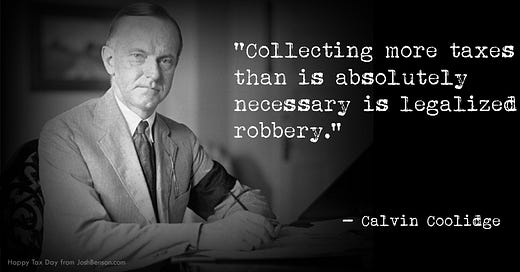Presidents' Day Reruns: Cal Coolidge and Chester A. Arthur!
It's a holiday! Why should I make something new?
Happy Presidents’ Day!
Here are some Presidents I have written about/spoken about before - Calvin Coolidge and Chester A. Arthur.
Yes, I know they’re not particularly popular Presidents.
Not-so-silent Cal Coolidge
Last year, my very first podcast episode for STUMP - Death & Taxes was on Cal Coolidge for Presidents’ Day. Coolidge was actually quite eloquent and did speak and write quite a bit in support of his policies, of which public finance was a big issue for him.
For that episode, I did create a transcript (which I didn’t keep doing for future episodes, sorry, as it requires a lot of editing).
Here is an excerpt:
I want to talk about Coolidge because of his special way he dealt with public finance in that he made things better. That's not necessarily unique to Coolidge, but he really really focused on that. He was a post-World War I president and in the Republican Party in World War I. As was usual from wars, obviously, the government debt went up — a lot of you know a lot of expenditures occur because of a war — a lot of bonds had gotten issued, and he wanted to reduce the federal debt.
So what exactly did Coolidge do?
….
And in the case of public finance, what had happened before he became president, was that the federal government debt that had run up due to World War I, and his focus was let us get that debt down. If you get the federal debt down, that will provide more flexibility for basically the rest of the economy to be able to do stuff, because then you don't have the specter of debt hanging over it.
They really wanted to increase federal revenue, pay down that debt; they had issued a bunch of bonds so let us, but we know pay down those bonds, get that debt down. How are we going to increase revenue?
So he listened to the Secretary of the Treasury, whose Andrew Mellon, you may be familiar with that name — Carnegie-Mellon — if you Carnegie-Mellon University. You may have heard of it. The Secretary of Treasury — keep up with,, the going to put scare quotes when it can you hear it —
“Scientific taxation”
and if you hear a government — you know anybody—put slap the word “scientific” in front of a political term, be very very wary; though in this case, it actually worked out.
So listen to that episode if you want to hear the rest of the story…
And cribbing from an even older Taxing Tuesday post, I have a Coolidge quote on taxes:
That meme-sized quote is a paraphrase. From this source, the Coolidge Foundation, the full quote is this:
The collection of any taxes which are not absolutely required, which do not beyond reasonable doubt contribute to the public welfare, is only a species of legalized larceny.
That’s from Coolidge’s 1925 Presidential Inaugural Address.
Chester A. Arthur and Corruption
Here’s a recent picture of me & the statue of Chester A. Arthur in Madison Square Park in Manhattan (not to be confused w/ the Garden):
It was in January, and the weather was a bit drizzly. I was walking through the square on the way to a meeting.
Back in July 2022, I wrote on Arthur:
By the way, I recommend the book The Unexpected President: The Life and Times of Chester A. Arthur by Scott S. Greenberger. I finished the audiobook this morning, and the book itself is only 300 pages.
I will admit, the depth of my knowledge on Arthur before reading this book was a gag on Futurama and that he became President due to James Garfield’s assassination.
Being the president did change [Chester A.] Arthur a little. It took a while, but he did start changing the spoils system a little. The legislation he used to help block, which would make illegal many things still illegal today:
- federal employees doing party business on their work time
- forcing federal employees to donate to political parties to keep their jobs (though….)And started a civil service reform so that people would get positions via competitive exam instead of via personal connection.
Of course, there are still problems with incompetent people being appointed at the very top of departments, but there’s no getting away from that.
One aspect of Arthur that I’d like to look into a bit more was his death at age 57 from stroke. He had been in poor health before then as well.
I had noticed a bunch of the Gilded Age nabobs having all sorts of health problems, and I’d like to do a little investigation into their causes of death (high levels of oral cancer, liver cancer, cirrhosis, stroke, gout, etc.?)
Maybe somebody has already looked into it — deaths of the Rich and Famous of the Gilded Age.
Enjoy!






